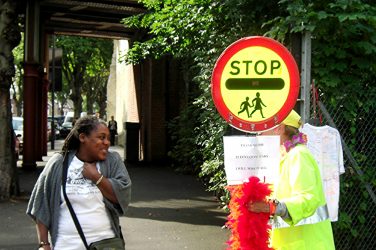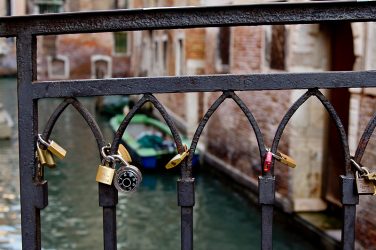E&M’s Julia Zalewska reckons with Polish President Duda’s crackdown on LGBTQIA rights before and after the Polish elections in July 2020.
I’ve never really considered writing about political issues before. It all changed with the situation in my country – Poland. The issues we’re dealing with need to be heard internationally. I am committed to what I stand for, and it’s in severe contradiction to what my country’s authorities stand for.
First, it was the protests against the tightening of abortion laws. It seemed unbelievable to me to protest for human rights in the 21st century. I felt furious and powerless at once – how did we get here? I’ve never felt so directly stripped of my freedom.
Duda’s stance on LGBTQIA rights
And just a few days ago, right before the presidential election, we heard our (and it feels shameful to say „our”) current President Andrzej Duda say: „LGBT is an ideology, not a people”. He also claimed the movement could be “even more destructive” than communist ideology and that we should protect children from it. Przemysław Czarnek, an MP from the ruling Law and Justice (PiS) party and member of Duda’s campaign team said during a televised debate on the issue: “Let’s stop listening to these idiocies about human rights. These people are not equal with normal people.”
I find no accurate words to describe how painful and undignifying it all feels. I despair at the news, the reports of wars, abuses, exploitation, the climate crisis, the COVID-19 crisis alongside all the small injustices. The worst thing I can’t adequately process is that it’s us, the people inhabiting the world, who make it that way. And I feel ashamed.
In the particular case of my home country Poland – I cannot imagine having a child in a country in which she or he could be treated as someone „not equal”, „not normal” just because of the way she or he was born. I cannot imagine how hard it must be to grow up in this country, surrounded by a cis-normative patriarchal culture, which by no means feels like a place for you to belong.
„I ask myself: what is this country in which one must die to be happy?”
To be anything but heteronormative in my country is unfathomable. How immensely hard must it be for a teenager to find their place in a hostile environment, with no sexual education at school, no family support and bullying by peers and society.
I’ve recently read an interview with the mother of Michal, who was a successful model – and gay. He dealt with bullying and persecutions since junior high school. Rather than stop the bullying, priests at the Catholic school he attended suggested that maybe his mother should talk to him, suggesting that there was something wrong with him not the bullies.
Michal committed suicide.
„I ask myself: what is this country in which one must die to be happy?” Michal’s mother said.
Ignoring the lessons from history
It feels like we have learned nothing from history – the Second World War, which ravaged Poland deeply. Left with scars, which I thought would never be forgotten, yet the same discriminatory rhetoric remains. Only last year, municipalities across Poland stated they were ‘free of LGBTI ideology’ and announced their openly anti-queer stance.
Historical comparisons are always difficult and necessarily inadequate. Yet, I cannot help to notice parallels. There already were „special zones”, and, later, ghettos in Poland before. Let me be clear: I do not compare situations to the horrors of the Second World War lightly. But it’s not just me who is afraid, the Veterans of the Warsaw Uprising 1944 spoke on the situation in similar vein: “We will not be indifferent to the dehumanization of a minority, reminiscent of the worst times in which we lived. We believe that we have a duty to speak out in defense of the weaker people.”
They quoted Marian Turski, a former prisoner of Auschwitz: „Don’t be indifferent when any minority is discriminated against. – We will not”.
The Polish presidential elections
Poland just had national elections. The first round of elections took place on 28th of June. And the results frighten me, as many young people voted for the Confederation (Konfederacja) party, which spreads nationalist statements, diminishing women and sexual minorities. Some people claim to be convinced by their economic programme.
As Poland faces a run-off vote on the 12 of July, the choice about the future of Poland has been described as one between a “democratic and an authoritarian Poland”.
How, in 2020, can we justify voting for a party, whose leader posts on twitter: „I must admit that I am worried about expressing joy, that the percentage of men who support CONFEDERATION has fallen. My goal is to have the support of 40% men and 5% women. Men are paving the way for change. Women follow men in the future.”
As Poland faced a run-off vote on the 12 of July, the choice about the future of Poland has been described as one between a “democratic and an authoritarian Poland”.
By a 2.00% margin, the authoritarian has won: Duda secured 51.0% compared to Trzaskowski’s 49.0%.
What does this mean for me, for my friends, for Poland – post-election?
I’m disappointed, yet not surprised. I see all my closest friends demotivated and sad, some of them have cried upon hearing the results. I wonder, what it is going to be like in the future? I try to remain positive, but I have stomach-churning thoughts. Should I move abroad? I always wanted to, but not like that, not now – not when I am feeling forced to do so.
We all need to think about our very own humanity, reflect on what we see, feel and think, when facing another human being. Because it’s also about the way you would like to be treated yourself – with the kindness and the respect that we all deserve.
Cover Photo: Jasmin Sessler on Unsplash











Show Comments
Comments are closed.